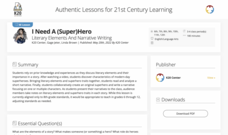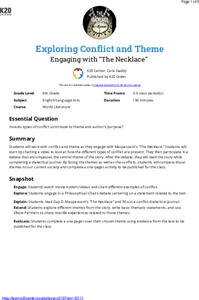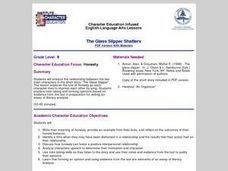K20 LEARN
The Eyes of Dr. T. J. Eckleburg: The Great Gatsby and the Sense of Sight
To conclude a study of The Great Gatsby, class members create a multimodal project that represents what they feel the eyes of Dr. T.J. Eckleburg see about the hidden side of one of the characters in F. Scott Fitzgerald's classic novel....
K20 LEARN
Lord of the Flies Unit, Lesson 8: In The End
To end the unit, groups use the Honeycomb Harvest strategy to show connections among a character, symbols, and themes in the novel and then create an Anchor Chart for the character that includes a symbol that best represents him. They...
K20 LEARN
Lord of the Flies Unit, Lesson 7: Good To Be Bad
The seventh lesson in the Lord of the Flies unit asks scholars to consider whether or not an individual can overcome the worst thing they have ever done. Groups read different articles related to the question, share their expertise in a...
K20 LEARN
Lord of the Flies Unit, Lesson 4: Bad to the Bone
Is the nature of humans inherently good or evil? That is the question scholars consider in the fourth lesson of the Lord of the Flies unit. In a Four Corners activity, they examine statements about human nature and stand by the poster...
K20 LEARN
Lord of the Flies Unit, Lesson 6: I've Got The Power
Readers of Lord of the Flies consider the symbols of power William Golding uses in his dystopian novel and support their choice with evidence from the text.
K20 LEARN
Lord of the Flies Unit, Lesson 3: Behind the Mask
After watching a video about masks from many cultures, class members research the history of masks and build a Driving Question Board. Individuals then create a mask for a character from The Lord of the Flies, justifying elements of...
K20 LEARN
Lord of the Flies Unit, Lesson 1: I'm A Survivor
What three readily available things would you grab in case of an emergency? That's the question that launches a unit study of William Golding's The Lord of the Flies. After sharing their choices, class members read Golding's rationale...
K20 LEARN
Ichabod and Brom - Two Wild And Crazy Guys: Characters' Differing Perspectives
After reading Washington Irving's "The Legend of Sleepy Hollow," class members compare the characteristics of Ichabod Crane and Brom Van Brunt. Next, they read an article about ghosts that supposedly haunt the campus of Oklahoma...
K20 LEARN
Ichabod and Brom - Ghostfacers: Credibility and The Legend Of Sleepy Hollow
A headless horseman? Really? A reading of "The Legend of Sleepy Hollow" launches a study of how to use the A-CLAP strategy to determine a story's credibility. Writers employ these techniques to craft their ghost stories and make them...
K20 LEARN
I Theme, You Theme, We All Theme For Ice Cream: Themes In Literature
Teach readers how to distinguish between a topic and a story's theme in a short lesson that uses the children's book, Should I Share My Ice Cream, as an exemplar. After listening to the story, pairs generate a list of topics covered in...
K20 LEARN
I Need A (Super)Hero: Literary Elements And Narrative Writing
Need a hero? Super! Groups create their modern-day marvel and craft a narrative with all the elements required in such a tale.
K20 LEARN
Friends, Romans, Countrymen, Lend Me Your Emotions: Julius Caesar
Scholars, high schoolers, class members! With the help of this lesson, you too can identify the three persuasive appeals (ethos, pathos, and logos) the characters in William Shakespeare's tragedy Julius Caesar used to convince their...
K20 LEARN
Growing Themes
The theme of a work is not a single word! Rather it is a statement that reflects what a writer believes or wants readers to understand about a topic or subject. Here's a short, but powerful lesson that utilizes passages from The...
K20 LEARN
Criminal Motivations: Irony and Characterization In "The Cask Of Amontillado"
Edgar Allan Poe's short story "The Cask of Amontillado" is a bit of a puzzle. Critics have long debated Montresor's motives for killing Fortunato. Young scholars examine examples of the three types of irony (verbal, dramatic, and...
K20 LEARN
Exploring Conflict And Theme: Engaging With "The Necklace"
Teach young scholars how to determine the theme of a story, an insight the author wants to share with readers, with a lesson that uses Guy de Maupassant's "The Necklace" as an anchor text. Learners examine the internal and external...
K20 LEARN
Being Mindful Of Sadness In "The Scarlet Ibis": Theme And Characterization
James Hurst's short story "The Scarlet Ibis" provides readers with an opportunity to consider how they can support others who are experiencing distress. Participants learn self-care tips and connect to the short story's characters. They...
K20 LEARN
Antigone's Themes Today: The Greek Drama Antigone
Is Antigone relevant to today's readers? After reading Sophocles' tragedy, scholars must decide if the themes are universal and timeless. Class members engage in a series of activities designed to have them closely consider the...
K20 LEARN
Active Shakespeare: Making Shakespeare Accessible
Two sonnets, both alike in theme and story, break from ancient language to new glory. The prologue to Act I of Romeo and Juliet provides scholars with an opportunity to examine the language Shakespeare uses to create timeless stories....
K20 LEARN
"The Lady, Or The Tiger?" Which Do You Choose?: Internal and External Conflict
"How come there's no ending?" After a close reading of Frank R. Stockton's tale "The Lady, or the Tiger?" in which scholars examine each of the main characters' conflicts and motivations, writers craft their own ending using textual...
K20 LEARN
Here's How I Heard It: Using Folklore To Improve Close Reading Skills
"X" is for exaggeration, and "F" is for fact. To encourage close reading and to improve literary analysis skills, class members annotate fables and tall tales, like Paul Bunyan, with symbols that identify key features of this genre.
Penguin Books
Educator's Guide: The Da Vinci Code by Dan Brown
Dan Brown's The Da Vinci Code is filled with secrets. Help readers find the clues, solve the riddles and puzzles, and unwrap the mysteries with a six-page guide that includes before, during, and after reading discussion questions and...
National Endowment for the Humanities
Navigating Modernism with J. Alfred Prufrock
Learners explore the role of the individual in the modern world by closely reading and analyzing T.S. Eliot's "The Love Song of J. Alfred Prufrock."
Common Sense Media
My Online Code
Approach ethical online behavior with a series of activities geared toward teaching pupils about digital citizenship. After a brief discussion about ethics, small groups inspect a fictional social networking profile with ethics in mind....
Orange County Department of Education
The Glass Slipper Shatters
High school freshmen craft their own definition of honesty. They provide an example from their lives and reflect on the outcomes of their honest behavior. They also identify a time when they may have been dishonest in a relationship and...

























